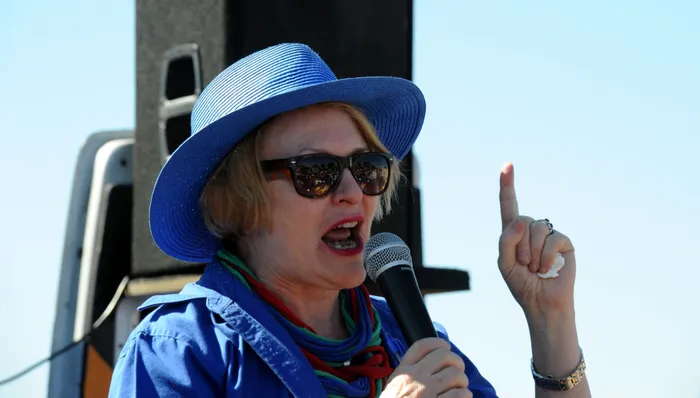
DA’s federal council chairperson Helen Zille said the ANC or DA could fix the problems in the City of Johannesburg if given majority votes.
Image: Werner Beukes/SAPA
The battle for Johannesburg’s mayorship intensifies, Dada Morero is emerging as a formidable challenger to the Democratic Alliance’s Helen Zille.
Morero’s appeal among township voters, especially in Soweto, is growing, fuelled by critiques of the DA’s performance in poor areas and mounting frustration over the party’s silence on Gaza.
The DA is under fire for what many locals and opposition figures call neglect in impoverished areas in the Western Cape. Earlier this year, ANC deputy president Paul Mashatile visited townships such as Gugulethu and Khayelitsha, pointing to “filthy streets”, overflowing rubbish heaps and inadequate municipal services. He accused the DA government of ignoring these communities.
Helen Zille responded forcefully, calling Mashatile’s claims “bulls**t” and insisting that the DA does more for poorer neighbourhoods than for affluent ones like Camps Bay.
But for many residents, those assurances ring hollow. Mass dissatisfaction with service delivery has become a key vulnerability for the DA, especially in regions where inequalities are starkly visible. For Morero, whose roots in Soweto resonate with many township dwellers, this presents a political opening: people who feel abandoned may seek a change in leadership.
Another growing issue threatening the DA’s appeal is its stance on the conflict in Gaza. South Africa has taken Israel to the International Court of Justice (ICJ), accusing it of genocide in Gaza. In an interim ruling on January 26, 2024, the ICJ ordered Israel to take all measures within its power to prevent genocidal acts and to ensure that Palestinian rights are protected under the 1948 Genocide Convention.
For many voters, especially those sensitive to South Africa’s apartheid history, the question of recognising genocide in Gaza is not just international policy; it’s a matter that reminds them of the real realities of many South Africans under apartheid.
On this front, Zille has clashed with critics. In a recent interview, she was pressed about whether she believed Israel is committing genocide. She responded: “Genocide is a very big word. I haven’t been to Gaza, and I don’t know.”
She has drawn sharp criticism. The EFF, Rise Mzansi, and other opposition parties have argued that such a stance amounts to siding with the oppressor by default. “Anyone with eyes, ears and a heart for humanity acknowledges that a genocide is being committed,” said Mabine Seabe of Rise Mzansi.
While Helen Zille continues to enjoy high media visibility, many analysts believe this may not translate into electoral gain. Zille’s public profile is high, and she is seen by many in the DA as a trusted veteran.
But township voters, long feeling underrepresented, appear increasingly willing to test alternative leadership. Morero’s appeal in Soweto reflects that sentiment, suggesting the “green light” from township structures could boost his standing.
Meanwhile, the DA’s national positioning, balancing service delivery criticism and foreign policy debates, could alienate both its traditional base and those swing voters who prize moral clarity. The combined pressure of local grievances e.g. infrastructure, municipal service delivery, and international moral questions like Gaza is shaping up to be one of the defining themes of the Johannesburg race.
*The views expressed here are not necessarily the views of IOL or Independent Media